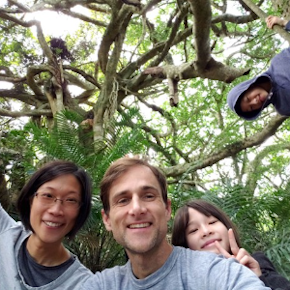Dear Friends,
As we transition into our new roles, Gordon and I have been reflecting deeply on Mondamin’s history and future. Through conversations with our alumni, our staff, and our sisters at Green Cove, we are identifying the core traditions that should remain, as well as the aspects of camp that call for revision going into our second century.
One in need of change is our logo. We have decided to retire the American Indian silhouette and to replace it with an image that aligns with the values we seek to teach our campers. Our new logo will be created over the next couple of months, but I’d like to offer some explanation for this decision now as well as some thoughts for the way forward that we, the Bell family, envision.
At campfire, most of you have heard the story of Hiawatha and Mondamin, “the friend of man,” as told in the voice of the American poet Henry Wadsworth Longfellow. This story is actually based on a sacred Ojibwe legend that Longfellow had read about in his research. The Ojibwe are one of the indigenous peoples of the Great Lakes region, and despite a painful history of displacement and forced assimilation, they are today one of the largest First Nations populations in the US and Canada. In their tradition, Mondamin is the spirit of the corn, or the corn father. Their story holds great meaning for us at camp because it has the power to convey values we strongly believe: that deep reflection can lead to new insights, that great reward can come from struggle and labor, and that the betterment of the community is nobler than individual heroics.
The Native American silhouette we have used as our logo since the 1920s was chosen with honorable intent, I believe, to invoke the profound meaning of this story, but like other emblems and mascots based on native peoples, it unfortunately negatively impacts Native Americans by appropriating their culture according to our needs, not theirs. The war-bonnet-wearing figure in the image is a romanticized depiction of an American Indian and has nothing to do with the story of Mondamin or the sovereign people to whom that legacy belongs. By generalizing and flattening the diversity of American Indian culture, it regrettably contributes to the erasure of the Ojibwe (and other tribes), relegating them to a monolithic past, rather than actually honoring them as intended.
A further layer of impact must be considered. Camp Mondamin, like so many other camps in the Southern Appalachians, exists on the homelands of another first people, the Cherokee. Brutal wars and unfair treaties from the 1760s to the 1850s forced most of the Cherokee out of these lands, and yet thousands of their descendants are today thriving here in many of the areas we frequently visit to hike, paddle, and ride. Although our camp was established long after the tragic events described above, our use of a generic Native American logo has further added insult to their injury over the years.
I deeply regret the harm this image has caused, and I have felt for some time that it should be replaced. My conviction has been strengthened over the past two months by many letters and conversations we have had with alumni who also feel that now is the time to transition to a new logo, one that is more in line with our core values, values that include a deep respect for people and cultures other than our own.
We are now engaging in a deliberative process to create a new logo for the next chapter of Camp Mondamin’s legacy. However, the logo redesign will be only the first step in a much longer journey of reflection and self-education, activities very much in line with the fundamental values of Camp Mondamin since its founding by my grandfather. Given our history and our location, we would like to form a small committee of alumni, parents, and friends whose mission will be to explore camp’s relationship with native peoples in the past, present, and future. In reality, we have never had an active relationship with the Ojibwe or the Cherokee. How might we begin to change that? Beyond changing the logo, what can we do to begin to repair the damage of past harms? Are there ways that camp can become an ally to native peoples in general, and to the Ojibwe and Cherokee in particular? There are no easy answers to these questions, but by wrestling with the issue, I believe we will come away with a much stronger sense of camp identity and purpose as well as a richer connection to this land and its peoples, all of which will be shared with and benefit our campers.
If you have an image or message you think the new logo should include, let us know! Do you have a camper or future camper in the house? Ask them also! We’d be happy to hear from them and will make it a point to explain to the returning boys of 2024 why it has changed. And if you are interested in joining the committee on allyship with native peoples, just respond to this email, and we’ll include you on further communications.
Thanks as always for the ongoing support.
David Bell
Further Reading
Summary of the APA Resolution Recommending Retirement of American Indian Mascots, American Psychological Association.
Anishinaabe Ojibwe Migration and History on the Marquette Iron Range, April E. Lindala Director, Center for Native American Studies, Northern Michigan University.
Mille Locs Band of Ojibwe.
The Treaty That Forced the Cherokee People from Their Homelands, Smithsonian Magazine.
The Eastern Band of the Cherokee Indians.
Native American Legends: Mandaamin (Mondamin), Native Languages of the Americas Project.

